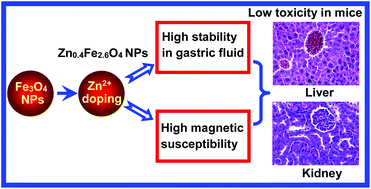Evaluation of zinc-doped magnetite nanoparticle toxicity in the liver and kidney of mice after sub-chronic intragastric administration
Abstract
Super-paramagnetic iron oxide nanoparticles (SPIONs) have been approved for clinical use due to their salient super-paramagnetic properties and low toxicity. Zn2+ doped SPIONs possess significantly higher magnetic susceptibility than that of conventional SPIONs. Here we evaluated the potential toxicity of Zn2+ doped Fe3O4 nanoparticles (Zn0.4Fe2.6O4 NPs) in the liver and kidney of mice after repeated intragastric administration for 30 days. Zn0.4Fe2.6O4 NPs did not cause significant changes in their body weights and the coefficients of the liver and kidney, but increased the levels of Fe and Zn in the two organs. Zn0.4Fe2.6O4 NP induced slight oxidative stress in the liver and kidney, which could be successfully counteracted by their intrinsic antioxidant systems and had no observable hazardous effects on the histopathology, ultrastructure and functions of the two organs. These results demonstrated that high-performance magnetic Zn0.4Fe2.6O4 NPs did not produce apparent toxicity in the liver and kidney of mice even after sub-chronic intragastric administration. In addition, Zn2+ doping not only markedly enhanced magnetic susceptibility of Zn0.4Fe2.6O4 NPs but also significantly increased the stability of Zn0.4Fe2.6O4 NPs in biological conditions, making them appropriate for use in magnetic resonance imaging and drug delivery by the oral route.


 Please wait while we load your content...
Please wait while we load your content...